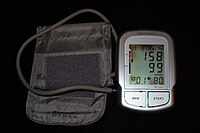
Photo from wikipedia
BACKGROUND Although the effects of salt intake reduction on casual blood pressure have been extensively studied in hypertensive individuals, data on reductions of added salt on arterial stiffness in both… Click to show full abstract
BACKGROUND Although the effects of salt intake reduction on casual blood pressure have been extensively studied in hypertensive individuals, data on reductions of added salt on arterial stiffness in both normotensive and prehypertensive subjects are scarce. OBJECTIVE To evaluate the effects of progressive reduction in added salt intake (from 6 grams to 4 grams per day) on peripheral and central blood pressure and arterial stiffness in normotensive, prehypertensive and hypertensive individuals. METHODS This was a single-blinded clinical trial with 13 weeks of follow-up. Normotensive (≤ 130/85 mmHg), prehypertensive (≥ 130 e < 139/≥ 85 e < 90 mmHg) and stage 1 hypertensive individuals (< 139/≥ 85 and < 90 mmHg) were assessed. Casual blood pressure measurements and ambulatory blood pressure monitoring were performed using the automated OMRON 705CP device, and central blood pressure was measured using the Sphygmocor®. Twenty-four-hour urinary sodium excretion and the amounts of added salt consumed were measured. Statistically significance level was set at p < 0.05 for all analysis. RESULTS A total of 55 participants (18 normotensive, 15 prehypertensive and 22 hypertensive), median age 48 years (IQR:39-54) were studied. The groups were not different in age or sex. No difference was observed in blood pressure or sodium excretion levels before and after the intervention. No significant changes in arterial stiffness parameters were observed. CONCLUSION The progressive reduction in added salt intake during a period of 13 weeks did not cause significant reductions in peripheral and central blood pressure. (Arq Bras Cardiol. 2020; 114(3):554-561).
Journal Title: Arquivos brasileiros de cardiologia
Year Published: 2020
Link to full text (if available)
Share on Social Media: Sign Up to like & get
recommendations!